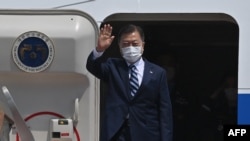South Korean President Moon Jae-in on May 21 will be the second world leader to meet face-to-face with U.S. President Joe Biden at the White House, marking what may be his final visit to the United States and last chance to fulfill campaign pledges before his term ends.
The discussions between the two leaders arrive just a few weeks after the Biden administration finalized its monthlong review of North Korea policy, one that signals a departure from previous administrations by pursuing a "calibrated, practical approach," said White House press secretary Jen Psaki.
This shift in rhetoric — one that strays from Obama-era strategic patience while refraining from making flashy deals — has yielded a "sense of calm" as Moon and Biden prepare to engage in talks, said Jean Lee, director of the Korea program at the Wilson Center in Washington, D.C.
"When you use that rhetoric, that fire and fury, it gives North Korea the justification to test, and when they have that, it means the arsenal gets that much stronger," Lee said. "The steadiness being exuded consistently by the Biden administration is designed to avoid this escalation of tensions we saw in the early parts of the Trump presidency."
Moon welcomed this open-ended approach in a nationally televised speech marking his four-year anniversary on Monday. Issuing a call to action to restore inter-Korean dialogue at the upcoming summit, he vowed to do everything he could to "restart the clock of peace."
"I will consider the remaining one year of my term to be the last opportunity to move from an incomplete peace toward one that is irreversible," Moon said.
North Korea is expected to be near the top of the meeting agenda. But while the two leaders have mutually vowed to work toward the ultimate goal of achieving a complete denuclearization of the Korean Peninsula, experts say Biden's incremental approach may potentially frustrate Moon, who has less than a year in office to follow through with his promised goals of securing a peace regime.
Despite these slight variances in timelines though, upholding the alliance between the U.S. and Republic of Korea will unwaveringly remain the top priority, said Kim Heung-kyu, who teaches political science at Ajou University and is the director of the China Policy Institute.
Lee echoed these observations, adding that North Korea will be closely watching the summit and that the joint meeting will "send a signal to the North that Moon has Biden's ear, which is a position of strength that Moon is keen to establish."
The Moon-Biden summit will mark Biden's second in-person meeting since he took office in January.
The first was also with an Asian leader, Japanese Prime Minister Yoshihide Suga, which serves as a strong indicator of the Biden administration's broader commitment to forging peace and security across the Indo-Pacific region, bolstering the U.S.-ROK-Japan trilateral security alliance, and preparing to strike back at China's growing influence.
Some of Washington's larger agenda items may have South Korea walking on a tightrope, though, and will heavily depend on "to what extent South Korea decides to participate," said Park Won-gon, who teaches North Korea studies at Ewha University in Seoul.
"With Korea-Japan relations still deadlocked, Biden is trying to make headway with the trilateral alliance before granting Korea and Japan space to find common ground on policies," Park added.
When it comes to China, Moon and Biden will likely home in on its ability to directly sway North Korea's policy.
Kim said that “in this sense, the two administrations will hope that China helps complete the picture instead of complicating it by conveying to North Korea messages that instill a positive influence on the regime.”
Apart from getting North Korea to join the negotiating table, experts project vaccine shortage issues may also be a topic of discussion Moon may want to push for.
The heated issue has in part caused his approval ratings to nosedive in recent months and starkly contrasts with South Korea's acclaim as a pandemic-era paragon for its rigorous test-and-trace program.
This upcoming summit's success, unlike that of conventional summits, might be determined by whether Moon manages to procure faster access to vaccines, a South Korean official told Reuters.
The summit may also open up a conversation on how South Korea and the U.S. can partner in the near future to play a role in global vaccine development and distribution.
But in the meantime, the more immediate challenge for Biden and Moon involves reaching a mutual decision on engaging North Korea while ensuring their timelines align.
"The challenge for Moon and Biden during this summit will be managing their differences behind closed doors while presenting a united front so that North Korea can't drive a wedge between them," said Lee.
Juhyun Lee contributed to this report.




